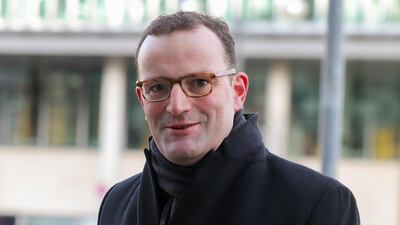An outspoken critic of German leader Angela Merkel’s ‘open door’ migration policy is set for a prominent role in her new government.
Jens Spahn, a 37-year-old tipped as a potential successor, will join the 15-strong cabinet as health minister as part of a major shuffling of top positions in a new coalition after months of negotiations.
The appointment of Mr Spahn highlights how Germany has moved towards a more hawkish immigration policy following gains by the far-right in elections last year.
The ambitious Mr Spahn is seen as a standard-bearer for the right-wing of the party and has called for a ban on the burka, demanded greater regulations for mosques, and said that imams should preach in German to promote integration and community cohesion.
"Germany may not be the right country for those who want to keep their wife in a burka or niqab, especially now that we have become such a sought-after destination for so many," he told the UK's Observer newspaper in 2016. "We need to send some strong signals about what is acceptable and what isn't."
_______________
Read more:
Angela Merkel under pressure to forge new German direction
The lingering presence of Angela Merkel and the consequences for the broader direction of Europe
_______________
Mr Spahn, a member of Mrs Merkel’s Christian Democratic (CDU) party, was named by Mrs Merkel on Sunday as one of her six picks for the cabinet.
Analysts said Mr Spahn’s likely selection is a sign of the increasing weakness of Mrs Merkel after years as the dominant figure in European politics.
A disastrous election last year has forced her to heed right-wing critics both inside and outside of her party.
Germany accepted more people than any other European nation during the migration crisis that peaked in 2015 that saw millions fleeing war and poverty. But the policy sparked a backlash and was a key factor in her conservative bloc’s worst election result since 1949, with major gains for the far-right Alternative for Germany party.
Mr Spahn’s proposed promotion from deputy finance minister is likely to be seen as a sop to those government opponents as well as an opportunity to rein in one of Mrs Merkel’s fiercest critics by promoting him to a top job in the leadership.
He has previously described Mrs Merkel’s migration policy as a “disruption of our state” and questioned the funding of mosques.
"Migrants especially from the Arabic countries and north Africa frequently pose challenges," he told the Times.
He previously called for Germany’s strong hate speech laws to be used to prosecute people who describe non-Muslims as infidels.
Mrs Merkel still requires members of the Social Democrats (SPD) to agree to the coalition deal before she can resume her fourth term at the helm of Europe’s largest and most successful economy.
The result of a ballot of the party’s 460,000 rank-and-file members is due to be announced in a week. The deal will hand the party control of the foreign and finance ministries.
Senior figures within SPD have expressed disquiet about continuing the power sharing agreement that ran from 2013 to 2017 after their own poor showing at last year’s elections.
The discontent resulted in the forced resignation of its leader Martin Schulz, whose authority had been eroded after reneging on a promise not to take part in a Merkel coalition.
But the failure to approve the deal will could see fresh elections in Germany, a move the SPD wants to avoid with opinion polls showing their support continuing to erode.
The SPD was Mrs Merkel’s second choice for coalition partner after an attempted deal with two smaller parties fell apart last year.
In response to growing rumblings in her party about her future, Merkel has promised to "renew" her government and make it younger.
She took a big step to grooming a successor last week by nominating ally Annegret Kramp-Karrenbauer, premier of the tiny western Saarland state, to take over as her party’s general secretary. She is only the fourth woman to govern a Germany state.
CDU members meet on Monday and are expected to approve the coalition deal and also Ms Kramp-Karrenbauer in her post.


